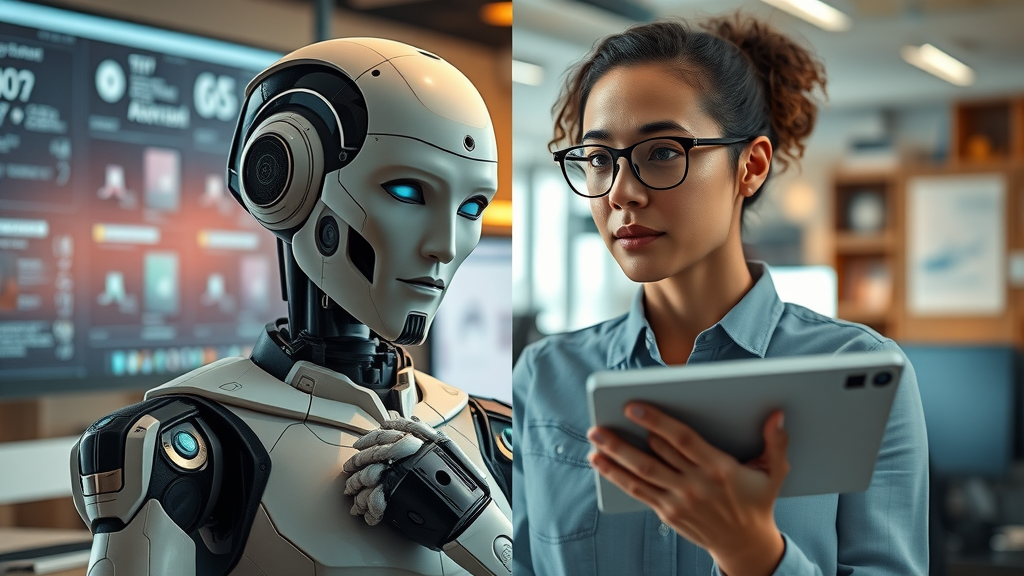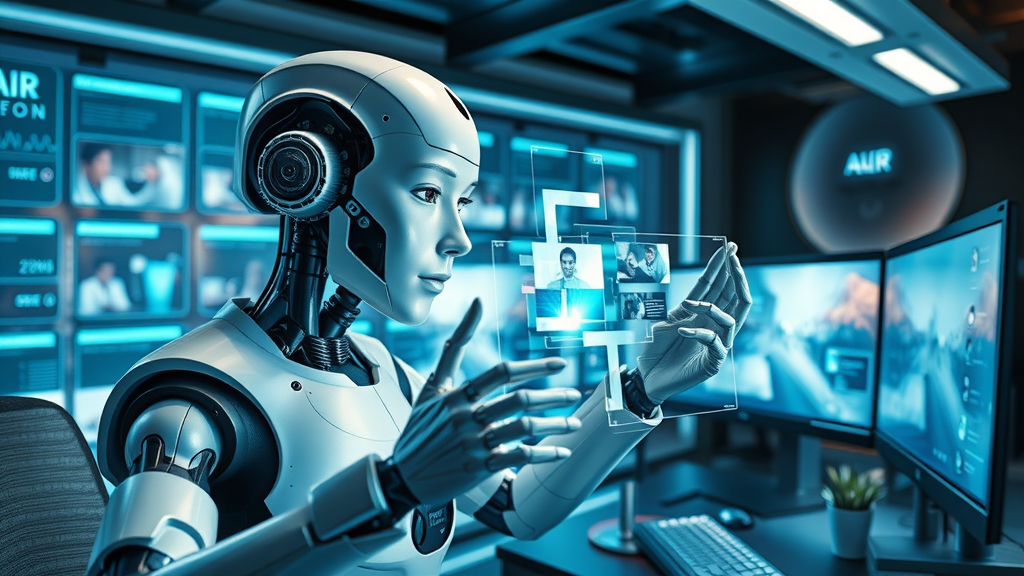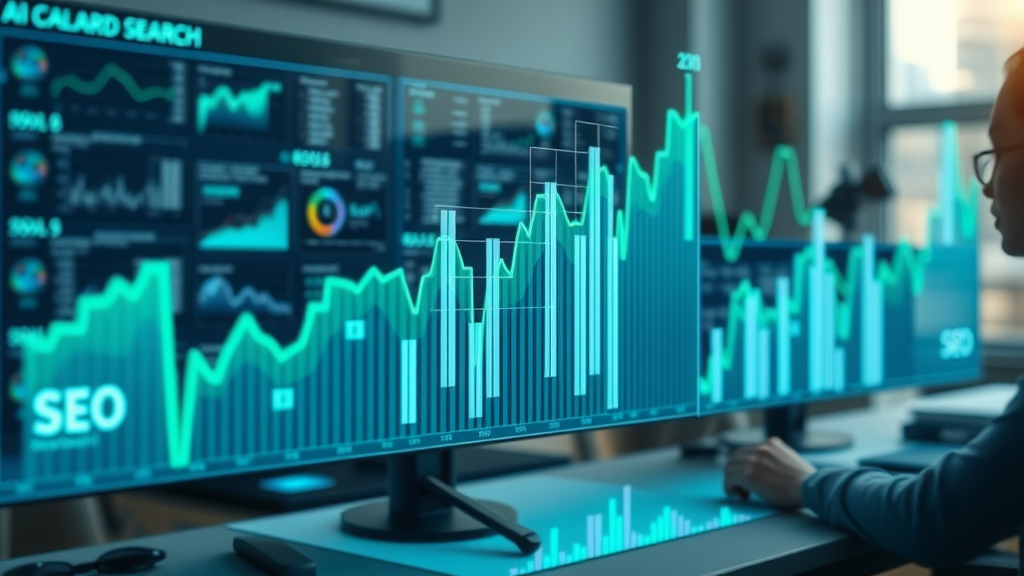Can artificial intelligence ever truly capture the spark of human creativity—or is it already outpacing marketers in Denver’s competitive service industry? As AI-powered tools sweep across the marketing landscape, business owners are asking tough questions: Should they trust data and automation, or rely on intuition and emotional intelligence to connect with their audience? In this article, we uncover what Denver service businesses really think about the hotly debated battle of AI vs human marketing.

Can AI Truly Replace Human Marketing? The Great Debate in Denver
As Denver’s entrepreneurial spirit collides with rapid advancements in artificial intelligence, service businesses face a pivotal question: Can AI truly replace—or even outperform—human marketers? While AI in marketing continues to revolutionize how companies analyze vast amounts of data and streamline repetitive tasks, many Denver-based experts remain divided over its proper role. The debate is intense. Some value AI’s predictive analytics and data-driven rigor; others champion strategic thinking, empathy, and the creative spark unique to humans. In reality, the answer isn't black or white. Both AI and human approaches offer compelling advantages for marketing strategy—but also present notable limitations. This makes Denver a fascinating test case in the national conversation about the future of marketing.
From automating ad campaigns to generating personalized social media posts, AI tools are everywhere in Denver’s service industries, praised for their efficiency and scalability. Yet, ask any leading marketer and you’ll hear the same refrain: campaigns still need the human touch for real resonance, originality, and emotional depth. The city's dynamic business owners are actively exploring hybrid models—seeking superior results by blending the analytical power of AI with the unique value of human creativity. This article dives into their experiences and expert opinions to illuminate why the debate is far from settled—and what’s truly at stake for your business.
Opening Inquiry: Are Service Businesses Ready to Trust AI Over Human Creativity?
Trust is the linchpin in this transformation. For Denver service providers, it’s not a simple choice between adopting AI and clinging to traditional methods. Many are grappling with whether clients will welcome content and marketing strategies crafted by algorithms, or whether audiences expect—and deserve—the unmistakable depth of human insight. The old-school model of brainstorming on a whiteboard isn’t obsolete, but new generations of marketers demand the precision offered by AI ad and content creation platforms. Recent surveys show a split: Some owners are ready to lean in on AI tools for competitive edge, while others remain deeply committed to the human side of marketing. The future? It may rest in striking just the right balance—leveraging technology without losing the emotional intelligence and empathy that define memorable brands.
What You'll Learn from Denver's AI vs Human Marketing Battle
- The fundamental differences between AI vs human marketing
- Insights from Denver business owners on human creativity vs artificial intelligence
- Where ai tools and generative ai outperform traditional marketing strategy
- How emotional intelligence and the human touch still matter in content creation
- What ai and human teams can learn from each other

Understanding AI vs Human Marketing: Definitions and Key Differences
What Is AI Marketing? (Artificial Intelligence Explained)

AI marketing uses sophisticated algorithms and machine learning to tackle tasks once reserved for seasoned professionals. Artificial intelligence enables marketers to quickly analyze vast amounts of data, identify trends in consumer behavior, and automate marketing efforts with breathtaking efficiency. AI excels at repetitive tasks, freeing up valuable time for strategy and creativity. Predictive analytics generated by AI tools allow businesses to forecast outcomes, optimize ad spend, and personalize campaigns at a scale that would be impossible for an all-human team. AI in marketing is already helping Denver service businesses make smarter, faster decisions—and to target content so precisely that click-through rates climb while wasted spends drop.
But there are challenges. AI can process vast amounts of data but struggles with nuance, emotional depth, and lateral thinking. While it delivers on technical optimization and speed, critics argue it cannot generate original ideas or authentically respond to rapidly changing cultural trends like a human marketer can. This is why the current marketing landscape focuses on integrating the best traits of both AI tools and human touch: leveraging speed and scale, without sacrificing strategic thinking or personalized resonance.
Unpacking Human Marketing and Human Creativity in Marketing Strategy
Human marketing is powered by intuition, empathy, and the creative leaps that only people can provide. While AI tools shine in operational efficiency and handling vast data analysis, human marketers infuse campaigns with brand voice, authenticity, and emotional intelligence. The human touch remains critical for building genuine connections—through storytelling that makes social media posts or customer experiences memorable. Human creativity isn’t just about aesthetics; it’s about solving problems no AI has been trained to recognize, and responding to subtle cues in evolving consumer behavior.
For Denver service businesses, human marketing strategies are often the differentiator in crowded fields. Marketers who invest in creativity, carefully crafted narratives, and grassroots community engagement consistently outperform even the most optimized AI ad or automated marketing strategies. Many believe that despite AI’s rapid advance, people still crave authenticity—a witty remark, a personalized email, or a campaign that captures the unique spirit of Denver. The greatest successes often happen when strategic intuition and emotional intelligence are blended seamlessly with powerful AI analytics. The table below compares key differences in the AI vs human marketing debate:
| Aspect | AI Marketing | Human Marketing |
|---|---|---|
| Creativity | Pattern-based, generative AI | Original, emotional intelligence |
| Content Creation | Fast, optimized by ai tools | Personalized, unique touch |
| Analytics | Predictive analytics, data processing | Strategic intuition |
| Emotional Intelligence | Limited | High |
The Rise of AI Tools in Denver's Service Marketing
Why Denver Businesses Adopt AI Tools for Marketing Strategy
- Case studies: ai excels in data-driven tasks
- Examples of predictive analytics in campaign management
- Generative AI and content creation advantages

AI tool adoption is surging in Denver, reshaping marketing strategies for service-focused companies. Why the enthusiasm? AI excels at transforming large, messy data sets into actionable insights nearly instantly. With the right platforms, teams can run predictive analytics to identify customer segments, optimize ad spend, and forecast campaign outcomes. These capabilities are game-changers in a fast-moving, hyper-competitive city like Denver where marketing agility matters. Local case studies reveal AI tools handling data analysis, A/B testing, and personalized email or social media campaigns, all with more precision and less manual labor.
Generative AI, in particular, is leveling up content creation by producing blog posts, media posts, and ad copy at a speed no human team could rival. AI tools are also invaluable for routine tasks like scheduling social media posts, monitoring engagement, or tracking conversions. But Denver experts warn: AI’s value peaks when paired with the human touch—someone to review, adapt, and push strategies beyond “good enough” to uniquely memorable. The balance between automation and strategy is where the most successful companies find their competitive edge.
Popular AI Tools Used by Denver Service Businesses
- Top ai tools for marketing automation
- AI tool integration for SEO and social media
Among the most widely used AI tools in Denver are platforms like HubSpot, Salesforce Einstein, and Hootsuite’s AI-powered features, all driving automation and performance. These ai tools simplify social media scheduling, generate analytics on customer behavior, and even recommend content for various platforms. For SEO, tools like SEMrush and Surfer AI offer predictive analytics that unlock quick wins for local rankings. Denver’s service businesses favor solutions that integrate with existing CRMs and marketing stacks, enabling marketers to see the whole customer journey at a glance. Still, experts point out that despite advanced features, human marketers must oversee campaigns to guarantee the brand’s tone and authenticity remain intact.
Human Creativity: The Edge of Human Touch in Marketing

Emotional Intelligence and Nuance: Where Human Marketing Shines
Emotional intelligence sets human marketers apart. While AI tools can analyze engagement metrics or run feedback loops, they can't authentically interpret or adapt to subtle social cues and evolving moods in a community. Denver’s diverse, values-driven consumers respond to stories, humor, and values that AI struggles to capture. Human team members recognize and adjust messaging in real time based on public sentiment—whether responding to a community crisis, a viral trend, or unique local contexts. This emotional intelligence drives the creative leaps that transform campaigns from forgettable to viral. And in Denver’s tight-knit marketplace, those who genuinely understand and reflect back the city’s spirit consistently outperform the competition.
Across interviews, Denver marketers sing the praises of strategic intuition and creative collaboration. Brainstorming sessions aren’t just about producing ideas—they’re about pushing one another to think bigger, connect on a deeper level, and craft narratives no algorithm could have foreseen. Human-led teams can quickly pivot strategies, align with shifting cultural moments, and keep brands fresh and relevant. AI tools are vital assistants, but in the end, there’s no replacing the “aha!” moment of a breakthrough that comes from real-life experience and creativity.
Human Creativity vs Artificial Intelligence: Content That Resonates
Content that resonates isn’t the result of templates or trend analysis alone—it’s born from an understanding of what makes people tick. Human marketers weave creativity and emotional depth into everything from website copy to social media posts, ensuring each message feels authentic and tailored. While generative AI can mimic style and produce acceptable first drafts, it rarely captures the originality or wit that gets people talking about a brand. For Denver service businesses, success hinges on content creation that stands out in the crowd—not just appears on time.
"No AI can match the on-the-ground empathy and insight our human team brings to Denver clients." – Local Agency Owner
With every campaign, Denver marketers prove that content crafted by real people can foster genuine engagement, provoke thought, and earn lasting loyalty. AI tools are an asset—great for optimizing, amplifying, and scaling. But when it comes to content that lingers in the memory or inspires action, it’s the human element that makes all the difference.
AI vs Human Marketing: The Hybrid Approach (AI and Human Collaboration)
Best of Both Worlds: Combining AI Tools and Human Touch for Superior Results
- How ai and human teams co-create successful campaigns
- Practical examples from Denver service providers
- Generative AI enhances, but doesn't replace, human-led strategies

The hybrid approach is rapidly becoming the gold standard for marketing strategies in Denver. By combining ai tools and human creativity, service providers are running more innovative, measurable, and responsive campaigns than ever. It starts with leveraging AI for what it does best—handling vast amounts of data, optimizing ad spend, and managing routine execution. Human teams then interpret, adapt, and push campaigns further with emotional intelligence and originality. In practice, this might look like using generative AI to produce a draft, which is then revised and “humanized” by creative pros who understand the nuances of brand and local culture. Successful Denver companies cite countless examples: AI-driven segmentation pinpointing key audiences, followed by uniquely tailored social posts written by local experts; automated A/B testing revealing what resonates, then refined through brainstorming in the agency’s creative bullpen.
Generative AI is viewed by Denver service businesses not as a replacement, but as a powerful extension—amplifying creative potential by handling repetitive tasks and offering new inspiration for human-led strategies. As feedback loops improve and machine learning becomes more personalized, the lines blur further—and the businesses willing to blend both are the ones consistently seeing superior results.
Generative AI and Content Creation: Opportunities and Limitations
Where Generative AI Excels in Marketing
- Speed and scalability in content creation
- AI tools for personalization and targeting

Generative AI has transformed content creation in Denver’s marketing scene. Instead of days spent writing or revising, service businesses now produce blogs, ad copy, and social media posts at unprecedented speed. These tools excel at processing vast amounts of data to craft highly targeted messages for specific demographics, saving time and resources. Marketers can rapidly test variations, harnessing AI-powered insights to maximize engagement across channels. For fast-turn campaigns or seasonal promotions, this level of speed and scalability is a clear advantage. With personalization algorithms, AI ensures each recipient gets just the right message at just the right moment—something previously only achievable by the largest, best-funded teams.
Yet, experts caution that leveraging generative AI is about augmentation, not replacement. AI tools handle routine drafting fast, but creative oversight is essential to maintain voice, authenticity, and relevance—especially in a dynamic, locally focused market like Denver.
The Limits of AI: When Human Creativity Outperforms
- Brand voice, cultural nuance, emotional intelligence
- Complex problem-solving needs human oversight

While AI keeps getting smarter, its limits are most apparent in areas requiring deep cultural context and emotional nuance. Humans effortlessly read between the lines—sensing when a campaign misses the mark, recognizing subtle shifts in audience sentiment, or elevating a bland message with a clever twist. Brand voice is notoriously difficult for AI to replicate, especially for companies with strong, values-driven identities. The emotional intelligence behind great storytelling, responsive crisis management, or viral campaign pivots simply can’t be coded into an algorithm (yet). In complex situations or markets like Denver’s—where every neighborhood has its quirks and every audience expects to be seen—human creativity is irreplaceable.
Service businesses in Denver increasingly use AI for groundwork: handling data analysis and delivering first drafts, but they rely on human talent for the final edit, responding to real-time events, or navigating strategy when the script goes off the rails. The future is clear: machines get you most of the way, but people get you all the way there.
Denver Voices: What Service Business Owners Say About AI vs Human Marketing
Direct Opinions: The Human Touch or AI Tool Dominance?
- Survey results: split preferences among Denver business owners
- Quotes from leading marketers on ai in marketing
"Our predictive analytics from AI tools drive sales, but it's our team's empathy that keeps clients loyal." – Denver Service Provider

Interviews and polls with Denver business owners reveal a divided—but rapidly converging—landscape. Roughly half say AI tools have become indispensable for managing data-heavy campaigns and achieving efficiency at scale. These leaders credit AI with boosting conversion rates, optimizing PPC spend, and taking the guesswork out of social media targeting. Yet, a significant number maintain that human touch and creativity are what set their brands apart and build genuine customer loyalty. Many respondents advocate a blended strategy, pairing data-driven insights from AI with stories, experiences, and resonant messaging crafted by skilled human marketers. The consensus: Denver’s most successful service businesses don’t choose sides—they combine tools and talents for best-in-class results.
The bottom line from local experts is pragmatic. AI makes you smarter, faster, and more efficient, but the brands winning in Denver are those that know when and how to use each resource. The secret is to let AI handle repetitive tasks and data-driven optimization, while reserving strategic thinking and emotional engagement for the human team. The modern marketer isn’t a robot or an artist—it’s both, working in partnership for outcomes that neither could achieve alone.
AI and Human Teams: Building Future-Proof Marketing Strategies
Strategic Recommendations for Denver's Service Providers
- Invest in ai tools for automation and insights
- Foster human creativity with training on new technologies
- Blend human touch with ai excels for balanced marketing strategy
Denver’s forward-thinking service businesses aren’t waiting for the future—they’re building it now. To future-proof your marketing strategy, start by integrating leading AI tools for rapid data analysis, automation, and operational efficiency. At the same time, double down on training, ensuring your team knows how to get the most from both new technology and their own creative instincts. Embrace cross-disciplinary collaboration; bring AI tool specialists and human creatives together to brainstorm, review results, and continuously improve campaigns. The best results consistently come from teams that acknowledge both strengths and build solutions that are more than the sum of their parts.
Remember: AI in marketing streamlines the “what,” but human creativity and emotional intelligence bring the “why” that connects with real people. Invest in both for a resilient, impactful presence in Denver’s vibrant service marketplace.
Watch: Local Experts Debate AI vs Human Marketing
In this exclusive panel discussion, Denver’s top marketers and agency leaders debate the strengths and weaknesses of AI tools, generative AI, and the enduring value of human creativity. They share firsthand experiences and offer actionable tips for balancing strategy, automation, and authenticity in your campaigns.
People Also Ask: AI vs Human Marketing
What are the main advantages of using AI in marketing for Denver businesses?
AI in marketing empowers Denver businesses with speed, scale, and precision. AI tools can analyze massive amounts of customer data, track and learn from campaign performance, and personalize content far more effectively than traditional manual methods. The use of predictive analytics enables marketers to target the right audience at the best time. This frees staff for higher-order strategic thinking and creative tasks, giving businesses a competitive edge in Denver’s fast-changing environment.
Is emotional intelligence more important than data in marketing strategy?
Both are critical for a successful marketing strategy. While data offers a clear pathway for optimization and targeting, emotional intelligence provides the human touch that resonates with real customers. Most Denver experts recommend blending the two—leveraging analytics for decision-making, but prioritizing emotionally intelligent content and authentic storytelling to foster lasting customer loyalty and differentiate your brand.
How do Denver service businesses use AI and human creativity together?
Many Denver businesses employ AI tools for routine data analysis, audience segmentation, and automated ad or media posts. These outputs are then reviewed, adapted, and enhanced by human marketers, who inject creativity, brand voice, and cultural nuance. This co-creative, hybrid approach ensures campaigns are both efficient and emotionally resonant, maximizing results across content creation, social media, and overall marketing campaign performance.
Can generative AI fully replace human marketers?
No—generative AI is a powerful tool for accelerating content creation and scaling personalized messaging. However, it cannot replicate the emotional intelligence, original thinking, and adaptability that human marketers bring. Full replacement is unlikely; instead, Denver’s forward-looking businesses blend generative AI output with real human oversight to ensure campaigns are relevant, authentic, and connected to their audience’s needs.
Watch how leading Denver companies leverage the latest AI tools to transform their marketing strategy—from real-time analytics to automated content creation. The video features case studies and behind-the-scenes looks at hybrid teams in action.
FAQs about AI vs Human Marketing in Denver
What is the biggest limitation of AI in marketing?
The greatest limitation of AI marketing is its struggle with context, emotional nuance, and creative originality. While AI excels at repetitive tasks, data analysis, and predictive analytics, it lacks the strategic intuition and empathy required for complex brand storytelling or rapid crisis response. In Denver’s diverse and values-driven market, this human factor is crucial for standing out.
Will AI reduce marketing jobs in Denver?
AI is transforming—not eliminating—the marketing workforce. As automation takes over routine or data-heavy tasks, human marketers are increasingly valued for creativity, relationship-building, and strategic vision. Most Denver experts predict a shift in skills rather than outright job loss, with growing demand for professionals who can blend technical and creative capabilities in modern marketing teams.
Key Takeaways: AI vs Human Marketing for Denver Businesses
- AI marketing delivers speed and analytics; human marketing provides creativity and empathy.
- The best results come from combining ai tools and the human touch.
- Denver businesses are increasingly blending generative ai and emotional intelligence in their strategies.

 Add Row
Add Row  Add
Add 




Write A Comment